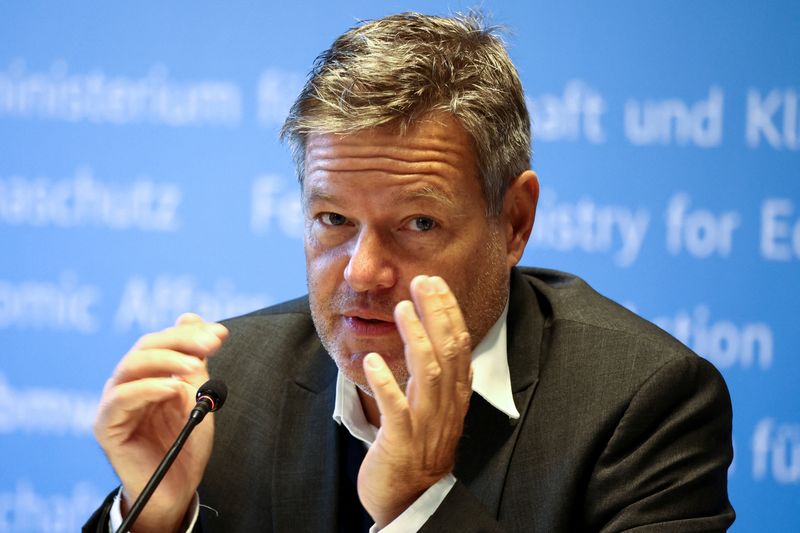By Christian Kraemer, Miranda Murray and Maria Martinez
BERLIN/NEW YORK (Reuters) -German Economy Minister Robert Habeck laid out plans to remedy weak growth in Europe's largest economy on Wednesday by starting a fund to stimulate investment and changing course on Germany's budget policy.
Creating a climate-neutral modern industrial future requires massive investment, both public and private, which is being held back by Germany's restrictive budgetary policy, Habeck wrote in a 14-page position paper.
"There is too little leeway in the budget to enable private and public investment on a significantly larger scale than today," he wrote.
The International Monetary Fund (IMF) this week significantly downgraded its forecasts for Germany. No other major industrialized country is currently weakening as much.
Habeck, whose name has been widely floated as the Greens' candidate for chancellor in elections next year, took aim specifically at the country's constitutionally enshrined cap on spending.
The debt brake is a sacred cow of the Free Democrats (FDP), which governs along with the Greens and Chancellor Olaf Scholz's SPD.
To bypass it, Habeck wants to introduce a multibillion-euro "Germany Fund" to modernise infrastructure and provide an "unbureaucratic" investment premium of 10% for all companies.
The proposed fund would focus in particular on small and medium-sized enterprises, large corporations and start-ups.
The investment premium would be offset against the company's tax liability. Unlike a simple improvement in write-offs, companies that do not make a profit at all, such as newly founded ones, would also receive the premium, wrote Habeck.
The measure should be limited to five years, he said, adding that greater economic growth should ensure the national debt would increase only moderately related to economic output.
Habeck, who joins a government delegation to India this week for talks on trade and investment, also called for slimmed-down trade deals with countries such as India and Indonesia that, for example, focus on industrial standards and leave out agricultural goods.
COALITION RESPONSE
German Finance Minister Christian Lindner said on Wednesday that experts at his ministry will examine in detail Habeck's proposal to check if it would be theoretically feasible.
"The economy ministry has not simply introduced a proposal for debate," Lindner said. "Robert Habeck is calling for a fundamentally different economic policy for Germany."
Lindner said that compliance with EU fiscal rules and European state aid rules is required and should be checked before the proposals can be discussed.
"We simply cannot spend as much money as some people want," he said in New York, before travelling to Washington DC for the International Monetary Fund and World Bank annual meetings.
FDP deputy leader Wolfgang Kubicki said Habeck's proposals could only be seen as serious if they acknowledged that there was not enough political support to abolish the brake.
He told the Rheinische Post newspaper that Habeck needed to state what the measure would cost current and future taxpayers.

The SPD's general secretary, Matthias Miersch, welcomed the proposal and said it was crucial now that all parties are working constructively on how to strengthen the German economy.
An industry summit planned for next week, where Scholz will meet industry associations, trade unions and firms, "is the right place for this," he told the Rheinische Post.